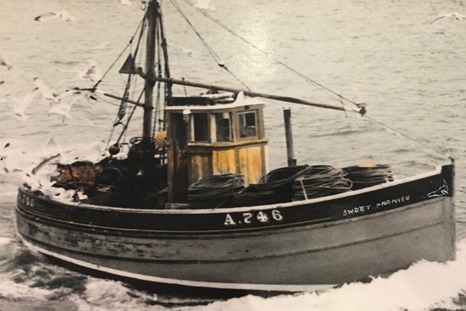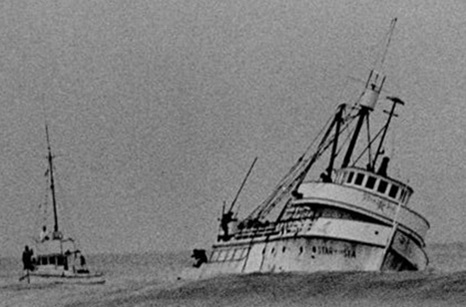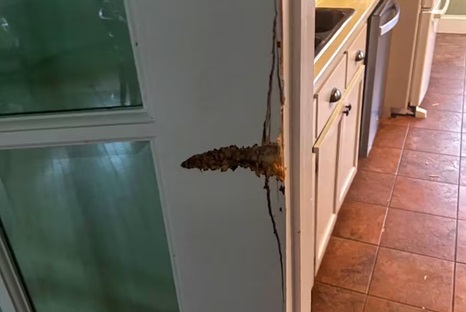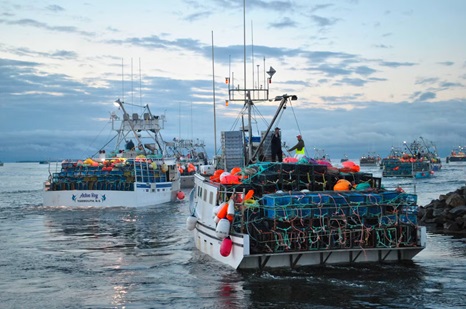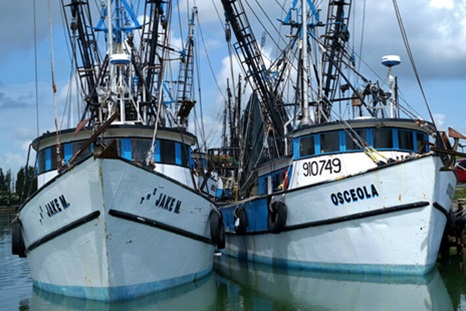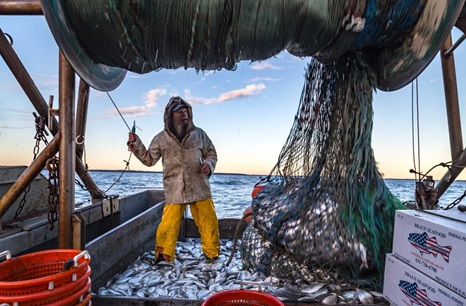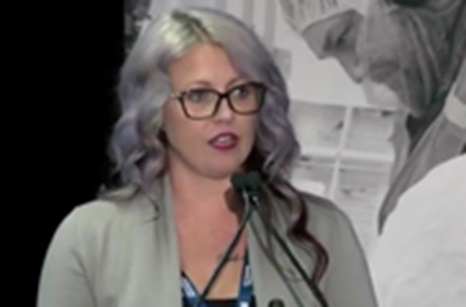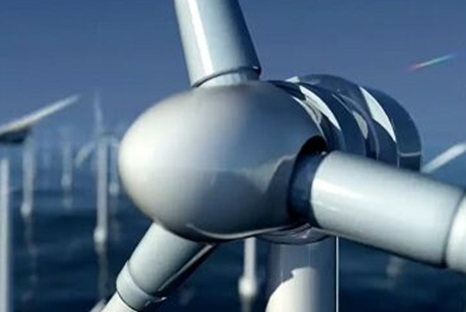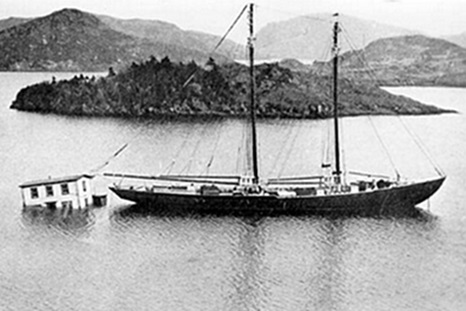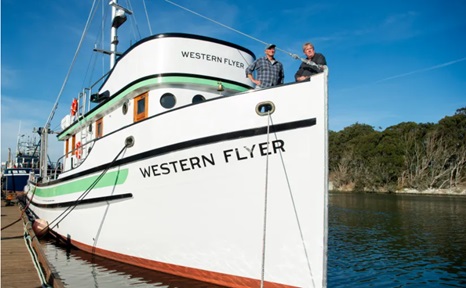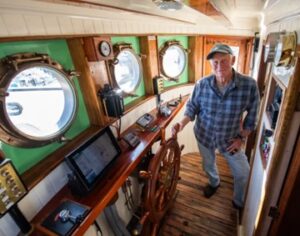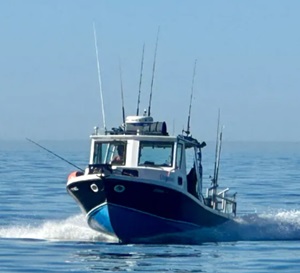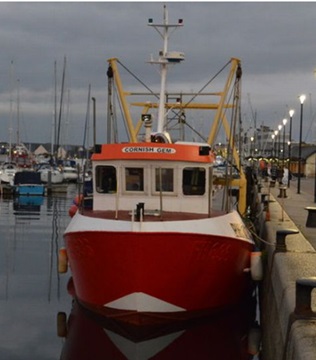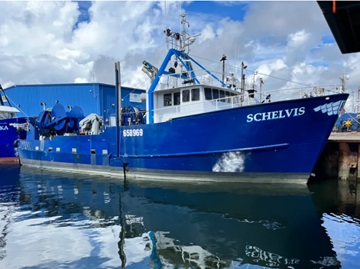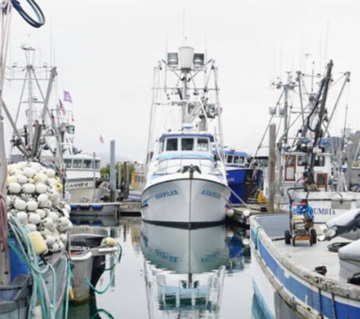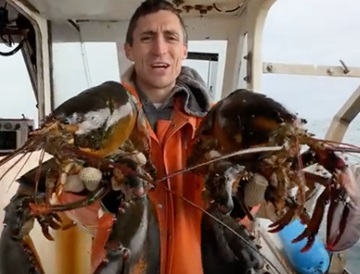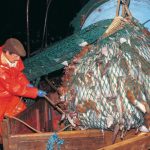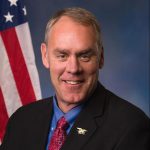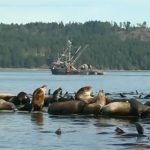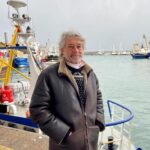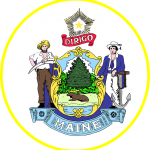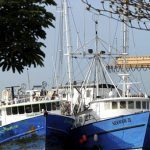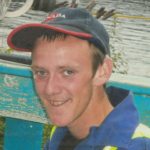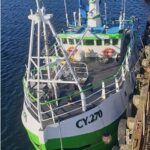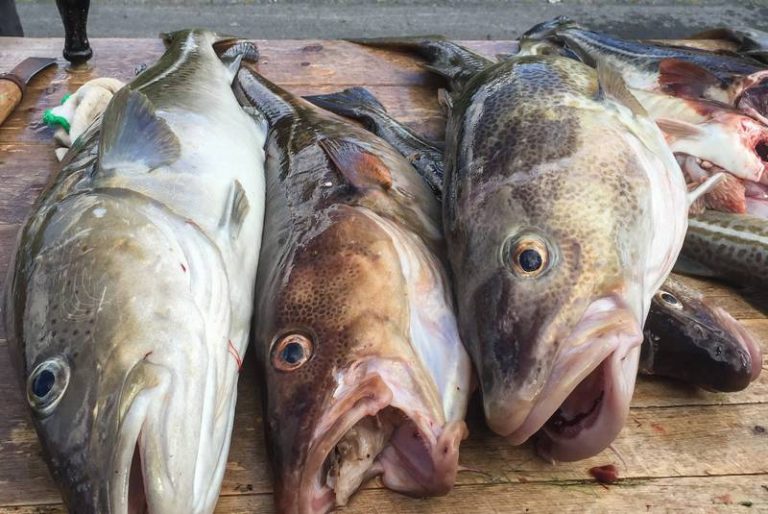Commercial Fisherman Robert Maxwell “Bob” Salter of Santa Cruz, California has passed away
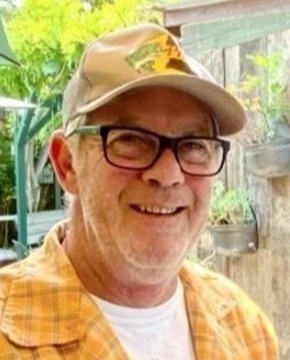 Family and friends are mourning the loss of beloved uncle and trusted friend, Bob Salter, who passed away at his Santa Cruz home with his loving family at his bedside. Bob was born in Santa Cruz to Frederick Salter and Fern Rianda Salter, he attended Delaveaga, B40, and Harbor High School. His father taught Bob the joy of fishing and love of the Sea. He grew up surfing and fishing with his brother Gary. His former boat was the Francis Jolene in the Santa Cruz Harbor. He fished for many seasons in Alaska and would visit family in Canada along the way. Bob had a lifelong career of commercial fishing and most recently fished out of Santa Cruz Harbor with Rick Ryan and his niece Bonnie Salter. >>click to read<< 10:27
Family and friends are mourning the loss of beloved uncle and trusted friend, Bob Salter, who passed away at his Santa Cruz home with his loving family at his bedside. Bob was born in Santa Cruz to Frederick Salter and Fern Rianda Salter, he attended Delaveaga, B40, and Harbor High School. His father taught Bob the joy of fishing and love of the Sea. He grew up surfing and fishing with his brother Gary. His former boat was the Francis Jolene in the Santa Cruz Harbor. He fished for many seasons in Alaska and would visit family in Canada along the way. Bob had a lifelong career of commercial fishing and most recently fished out of Santa Cruz Harbor with Rick Ryan and his niece Bonnie Salter. >>click to read<< 10:27
Norway: Cut to king crab quota recommended
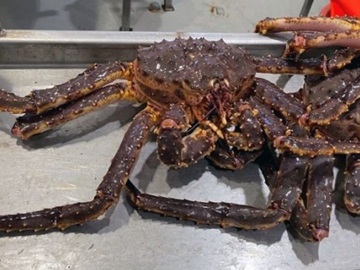 Based on the outcome of this year’s king crab survey, scientists at Norway’s Institute of Marine Research (HI) are recommending a hefty cut in the 2024 king crab quota to not more than 966 tonnes, as the survey results indicate a significant decline in the population. This means a substantial reduction compared to the quota advice for 2023, which was 2375 tonnes. ‘The result from this year’s survey shows a significant decrease in the number of crabs above the minimum target size for fisheries. The fact that we are now seeing a decline in the stock is, of course, bad news for the fishermen,’ said HI population manager for king crab, Carsten Hvingel. >>click to read<< 09:31
Based on the outcome of this year’s king crab survey, scientists at Norway’s Institute of Marine Research (HI) are recommending a hefty cut in the 2024 king crab quota to not more than 966 tonnes, as the survey results indicate a significant decline in the population. This means a substantial reduction compared to the quota advice for 2023, which was 2375 tonnes. ‘The result from this year’s survey shows a significant decrease in the number of crabs above the minimum target size for fisheries. The fact that we are now seeing a decline in the stock is, of course, bad news for the fishermen,’ said HI population manager for king crab, Carsten Hvingel. >>click to read<< 09:31
Vessel Review: Kapitan Sokolov
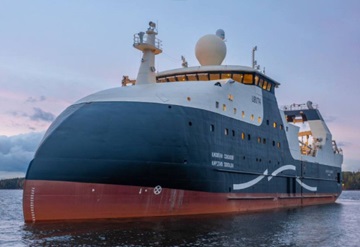 Russia’s United Shipbuilding Corporation, through its Severnaya Verf facilities in Saint Petersburg, has completed construction on a new freezer trawler ordered by local seafood company the Norebo Group. Kapitan Sokolov is the first of six Project 170701 freezer trawlers to be ordered by Norebo from Severnaya Verf. It has a steel hull, a length of 81.6 metres, a beam of 16 metres, a displacement of 5,500 tonnes, a hold capacity of nearly 1,500 tonnes of assorted fish products including fish meal and canned fish, and space for 80 crewmembers and fish processing personnel. >>click to read<< 08:34
Russia’s United Shipbuilding Corporation, through its Severnaya Verf facilities in Saint Petersburg, has completed construction on a new freezer trawler ordered by local seafood company the Norebo Group. Kapitan Sokolov is the first of six Project 170701 freezer trawlers to be ordered by Norebo from Severnaya Verf. It has a steel hull, a length of 81.6 metres, a beam of 16 metres, a displacement of 5,500 tonnes, a hold capacity of nearly 1,500 tonnes of assorted fish products including fish meal and canned fish, and space for 80 crewmembers and fish processing personnel. >>click to read<< 08:34
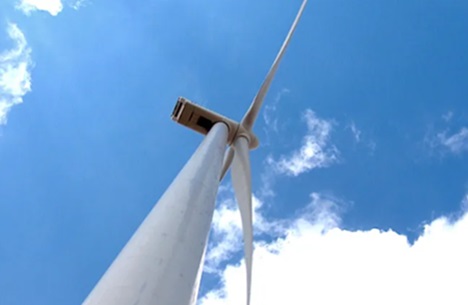
Fishermen in Maine lobbied to keep wind farms out of crucial fishing grounds. Will it happen in N.S.?
A no-compromise lobbying campaign by Maine lobster harvesters has helped keep wind farms out of a crucial lobster fishing area in the Gulf of Maine. And that has some fishermen in Nova Scotia casting an envious eye south of the border. “I’m pleased to see that happen in Maine. We’d like to see the same sort of diligence taken in Nova Scotia,” said Tommy Amirault, a fisherman from Pubnico and president of the Coldwater Lobster Association. “Maine obviously has concerns. It would be nice to 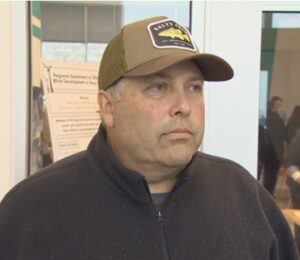 see both provincial and federal governments take our concerns into practice,” Amirault said. “We didn’t mince words that we opposed offshore wind anywhere in the Gulf of Maine. It’s one of the most productive ecosystems in the world. And we really didn’t think that this is the place to solve the renewable energy crisis,” said McCarron. In Nova Scotia, the process has just begun. He said it’s no surprise fishermen have concerns about where it happens. >>click to read<< 06:57
see both provincial and federal governments take our concerns into practice,” Amirault said. “We didn’t mince words that we opposed offshore wind anywhere in the Gulf of Maine. It’s one of the most productive ecosystems in the world. And we really didn’t think that this is the place to solve the renewable energy crisis,” said McCarron. In Nova Scotia, the process has just begun. He said it’s no surprise fishermen have concerns about where it happens. >>click to read<< 06:57
OPINION: North Pacific Fishery Management Council is acting to reduce bycatch
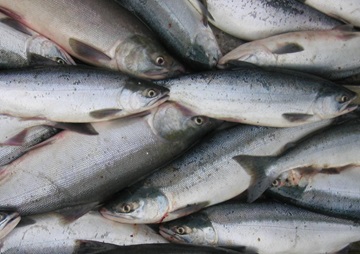 In a recent opinion piece, Brooke Woods, Linda Behnken and Nanci Morris Lyon stated, “Federal fisheries off Alaska are managed via the dictates of the North Pacific Fishery Management Council (NPFMC), which has done little to address the trawl fleet’s enormous bycatch of species immeasurably important to Alaskans.” Nothing could be further from the truth The council adopted hard caps for chinook salmon in the Bering Sea trawl pollock fisheries that vary depending upon the expected returns to western Alaska rivers. When expected returns are low, the caps are adjusted downward. Additionally, the fishing industry has stepped forward to implement chinook salmon avoidance measures that hold each vessel accountable for limiting bycatch to below the caps. In fact, the fleet is well below their caps, recognizing the need to rebuild these stocks. >>click to read<< 15:55
In a recent opinion piece, Brooke Woods, Linda Behnken and Nanci Morris Lyon stated, “Federal fisheries off Alaska are managed via the dictates of the North Pacific Fishery Management Council (NPFMC), which has done little to address the trawl fleet’s enormous bycatch of species immeasurably important to Alaskans.” Nothing could be further from the truth The council adopted hard caps for chinook salmon in the Bering Sea trawl pollock fisheries that vary depending upon the expected returns to western Alaska rivers. When expected returns are low, the caps are adjusted downward. Additionally, the fishing industry has stepped forward to implement chinook salmon avoidance measures that hold each vessel accountable for limiting bycatch to below the caps. In fact, the fleet is well below their caps, recognizing the need to rebuild these stocks. >>click to read<< 15:55
Doug Vincent-Lang
First Nations seek salmon return to Columbia Basin in new treaty with U.S.
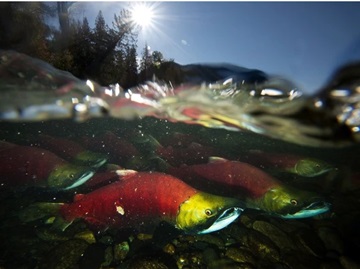 Representatives from the Ktunaxa and Syilx Okanagan nations say they continue to bring up salmon restoration in negotiations for a modern Columbia River Treaty and will not stop until a solution can be reached within or outside a new agreement. The U.S.-Canada treaty regulates the cross-border Columbia River to prevent flooding and generate hydro power. A key component of the 62-year-old treaty is set to expire in September 2024, lending urgency to the ongoing talks. “I think what we are doing in the fight to bring salmon back is vital to us moving forward,” said Lower Similkameen Indian Band Chief Keith Crow, who is a member on the Syilx Okanagan Nation’s Chiefs Executive Council and the Nation’s lead in the Columbia River Treaty talks. >>click to read<< 14:25
Representatives from the Ktunaxa and Syilx Okanagan nations say they continue to bring up salmon restoration in negotiations for a modern Columbia River Treaty and will not stop until a solution can be reached within or outside a new agreement. The U.S.-Canada treaty regulates the cross-border Columbia River to prevent flooding and generate hydro power. A key component of the 62-year-old treaty is set to expire in September 2024, lending urgency to the ongoing talks. “I think what we are doing in the fight to bring salmon back is vital to us moving forward,” said Lower Similkameen Indian Band Chief Keith Crow, who is a member on the Syilx Okanagan Nation’s Chiefs Executive Council and the Nation’s lead in the Columbia River Treaty talks. >>click to read<< 14:25
U.S. regulators will review car-tire chemical that kills salmon, upon request from West Coast tribes
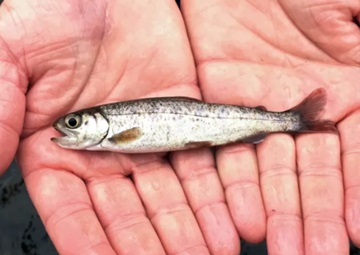 U.S. regulators say they will review the use of a chemical found in almost every tire after a petition from West Coast Native American tribes that want it banned because it kills salmon as they return from the ocean to their natal streams to spawn. The Yurok tribe in California and the Port Gamble S’Klallam and Puyallup tribes in Washington asked the Environmental Protection Agency to prohibit the rubber preservative 6PPD earlier this year, saying it kills fish — especially coho salmon — when rains wash it from roadways into rivers. Washington, Oregon, Vermont, Rhode Island and Connecticut also wrote the EPA, citing the chemical’s “unreasonable threat” to their waters and fisheries. >>click to read<< 10:14
U.S. regulators say they will review the use of a chemical found in almost every tire after a petition from West Coast Native American tribes that want it banned because it kills salmon as they return from the ocean to their natal streams to spawn. The Yurok tribe in California and the Port Gamble S’Klallam and Puyallup tribes in Washington asked the Environmental Protection Agency to prohibit the rubber preservative 6PPD earlier this year, saying it kills fish — especially coho salmon — when rains wash it from roadways into rivers. Washington, Oregon, Vermont, Rhode Island and Connecticut also wrote the EPA, citing the chemical’s “unreasonable threat” to their waters and fisheries. >>click to read<< 10:14
A business in crisis
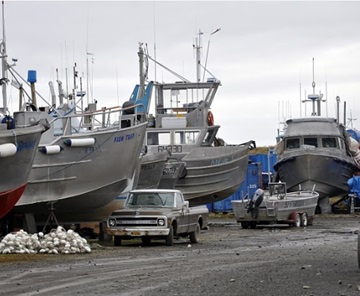 After years of choking on record runs of Bristol Bay sockeye salmon and near-record runs of heavily farmed, low-value pink salmon, the Alaska fishing industry is in chaos with processors now pleading for more government subsidies and coddled commercial fishermen demanding yet more disaster aid. One could blame global warming, which has led to historically unprecedented harvests of Alaska salmon despite whatever nonsense to the contrary the mainstream media might have reported, but the industry’s problems are far more complex than just trying to sell high-priced seafood in Western markets where the sales of animal protein are dominated by chicken, beef and pork. Some of the industry’s issues here are rooted in its long history. For most of the years after commercial fishing began in Alaska in the late 1800s, the business dealt almost wholly in canned salmon. >>click to read<< 08:41
After years of choking on record runs of Bristol Bay sockeye salmon and near-record runs of heavily farmed, low-value pink salmon, the Alaska fishing industry is in chaos with processors now pleading for more government subsidies and coddled commercial fishermen demanding yet more disaster aid. One could blame global warming, which has led to historically unprecedented harvests of Alaska salmon despite whatever nonsense to the contrary the mainstream media might have reported, but the industry’s problems are far more complex than just trying to sell high-priced seafood in Western markets where the sales of animal protein are dominated by chicken, beef and pork. Some of the industry’s issues here are rooted in its long history. For most of the years after commercial fishing began in Alaska in the late 1800s, the business dealt almost wholly in canned salmon. >>click to read<< 08:41

Wood and colleagues visit East Coast offshore wind project
“We as state legislators have a critical and essential role in fostering the offshore wind market in California by developing policies that support procurement and development, investment in ports and supply chains, and strategies and policies for maximizing local economic development,” said Wood. “We wanted to visit Massachusetts and attend this conference to learn what needs to be done and how to do it successfully. California has a number of key stakeholders and we need to make sure we are all rowing in the same direction, with the wind behind us, so to speak, avoiding any headwinds.” >>click to read<< 07:57
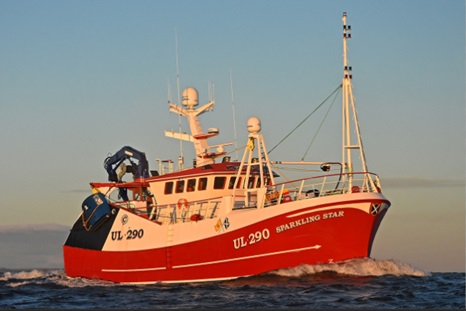
Quiksling proves its worth
The Quiksling retrieval device developed by George West proved its worth last summer when one of the crew of Scottish trawler Sparkling Star was caught in the gear when shooting away and pulled overboard. ‘Quick thinking by Ryan getting the Quiksling to him and lifted back aboard with the powerblock saved that lad’s life,’ skipper James Corbett reported. ‘It was a textbook recovery by the boys that just demonstrates the importance of proper training.’ >>click to read<<, and more here 06:47
Sinking of the Wild Alaskan – Document Dump #42
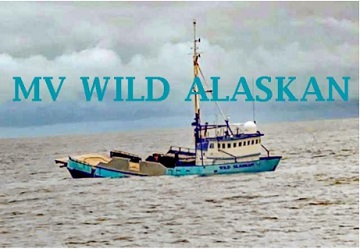 Document Dump #42 – In this Document Dump, I am releasing to the Public clear, convincing and undeniable evidence that certain Alaska State Troopers and Kodiak Chief of Police, Tim Putney are actively trying to cover-up one of Alaska’s biggest felony theft and destruction of property crimes in the history of this great state. I am a full supporter of Law Enforcement, just not the corrupt ones. As I have stated before, the actions of the Alaska State Troopers and the Alaska Bureau of Investigations have now morphed into a “HUB AND SPOKED WHEEL” RICO CONSPIRACY to cover-up a major crime which these people have no immunity from. There is no other way to explain it. Photos, >>click to read Document Dump #42<<. and more. 18:28
Document Dump #42 – In this Document Dump, I am releasing to the Public clear, convincing and undeniable evidence that certain Alaska State Troopers and Kodiak Chief of Police, Tim Putney are actively trying to cover-up one of Alaska’s biggest felony theft and destruction of property crimes in the history of this great state. I am a full supporter of Law Enforcement, just not the corrupt ones. As I have stated before, the actions of the Alaska State Troopers and the Alaska Bureau of Investigations have now morphed into a “HUB AND SPOKED WHEEL” RICO CONSPIRACY to cover-up a major crime which these people have no immunity from. There is no other way to explain it. Photos, >>click to read Document Dump #42<<. and more. 18:28
Canada’s largest fishing vessel will be ready for 2024, says Baffin Fisheries CEO
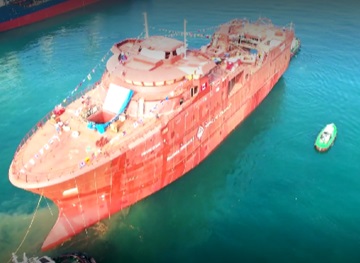 A ship being described as Canada’s largest fishing vessel — one that will soon make regular ports of call in Newfoundland harbours like St. Anthony, Harbour Grace and Bay Roberts was launched this week from a yard in Turkey, and the Nunavut-based owners say it’s on track to be harvesting turbot and shrimp from Arctic waters by next year. The vessel will also bear a name that’s quite familiar to ship-spotters in Newfoundland and Labrador: Inuksuk II. Baffin Fisheries currently operates a fleet of three fishing vessels, including the MV Inuksuk I. The vessel is 80 metres long, 18 metres wide, and will be capable of carrying up to 1,300 tonnes of frozen-at-sea turbot or 930 tonnes of shrimp. In comparison, the Inuksuk II is six metres longer than the Calvert, the newest vessel in Ocean Choice International’s fleet. >>click to read<< 14:30
A ship being described as Canada’s largest fishing vessel — one that will soon make regular ports of call in Newfoundland harbours like St. Anthony, Harbour Grace and Bay Roberts was launched this week from a yard in Turkey, and the Nunavut-based owners say it’s on track to be harvesting turbot and shrimp from Arctic waters by next year. The vessel will also bear a name that’s quite familiar to ship-spotters in Newfoundland and Labrador: Inuksuk II. Baffin Fisheries currently operates a fleet of three fishing vessels, including the MV Inuksuk I. The vessel is 80 metres long, 18 metres wide, and will be capable of carrying up to 1,300 tonnes of frozen-at-sea turbot or 930 tonnes of shrimp. In comparison, the Inuksuk II is six metres longer than the Calvert, the newest vessel in Ocean Choice International’s fleet. >>click to read<< 14:30
Commercial fish report shows impact of set-net closure
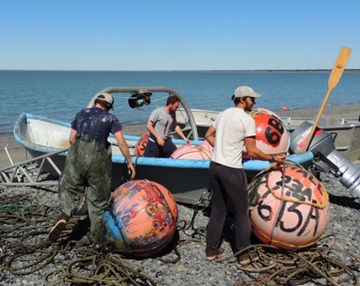 A recent report from the Alaska Department of Fish & Game shows the impact of the closure of a prominent fishery on the 2023 season for the commercial salmon industry in Upper Cook Inlet. Set-netters are worried about the future of their fishery, and the possible long-term impacts of over escapement. In Upper Cook Inlet, the report says, the 2023 commercial salmon harvest was about 40% lower than the 20-year average. Commercial fishermen caught 1.9 million salmon in the upper inlet, compared to the 20-year average of 3.1 million. Fish & Game attributes most of that decline to the closure of the east side set-net fishery, which the department closed before the season even began in anticipation of low king salmon numbers. >>click to read<< 13:04
A recent report from the Alaska Department of Fish & Game shows the impact of the closure of a prominent fishery on the 2023 season for the commercial salmon industry in Upper Cook Inlet. Set-netters are worried about the future of their fishery, and the possible long-term impacts of over escapement. In Upper Cook Inlet, the report says, the 2023 commercial salmon harvest was about 40% lower than the 20-year average. Commercial fishermen caught 1.9 million salmon in the upper inlet, compared to the 20-year average of 3.1 million. Fish & Game attributes most of that decline to the closure of the east side set-net fishery, which the department closed before the season even began in anticipation of low king salmon numbers. >>click to read<< 13:04
Pyridine ‘unlikely’ to be cause of mass shellfish die-off on Teesside, new test finds
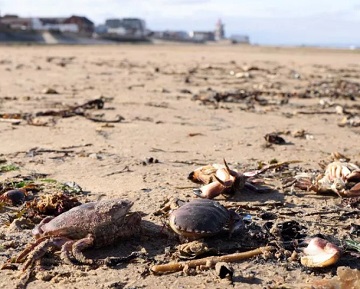 The latest investigation into the cause of mass creature die off along the North East coast has found an industrial chemical is unlikely to be the cause. The Government has today issued the findings of an investigation by the independent experts at the Centre for Environment, Fisheries and Aquaculture Science, who used a new method to test for the chemical, pyridine, in animal tissue and sediments. The original incident between October and December 2021 saw crustaceans washed ashore with dying creatures “twitching” and displaying lethargic behaviour right along the coast from Hartlepool down to Whitby. >>click to read<< 11:38
The latest investigation into the cause of mass creature die off along the North East coast has found an industrial chemical is unlikely to be the cause. The Government has today issued the findings of an investigation by the independent experts at the Centre for Environment, Fisheries and Aquaculture Science, who used a new method to test for the chemical, pyridine, in animal tissue and sediments. The original incident between October and December 2021 saw crustaceans washed ashore with dying creatures “twitching” and displaying lethargic behaviour right along the coast from Hartlepool down to Whitby. >>click to read<< 11:38
Virginia fisherman sentenced for illegally harvesting $37K worth of striped bass
 A Virginia fisherman has been sentenced for illegally harvesting striped bass over the course of several years. Commercial fisherman Keith J. Martin, 52, was sentenced to four months in prison on Oct. 26. He was required to begin his sentence by noon Dec. 12. It was recommended by the court to the Bureau of Prisons that Martin be incarcerated in a medical facility. Upon his release, Martin was sentenced to three years of supervised release. On the condition of and for the duration of his supervised release, Martin will be prohibited from participating in any form of commercial fishing,,, >>click to read<< 09:11
A Virginia fisherman has been sentenced for illegally harvesting striped bass over the course of several years. Commercial fisherman Keith J. Martin, 52, was sentenced to four months in prison on Oct. 26. He was required to begin his sentence by noon Dec. 12. It was recommended by the court to the Bureau of Prisons that Martin be incarcerated in a medical facility. Upon his release, Martin was sentenced to three years of supervised release. On the condition of and for the duration of his supervised release, Martin will be prohibited from participating in any form of commercial fishing,,, >>click to read<< 09:11
Newfoundland fishermen get ‘best news’ on northern cod stocks in a generation
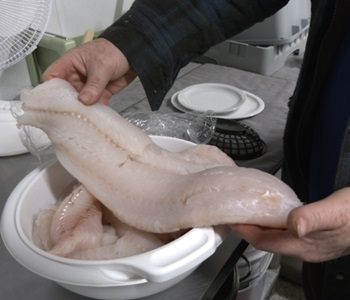 It’s a technical, scientific change: the Limit Reference Point, a key part of the assessment of a fish stock’s health, has been revised. Because of a change in their scientific method, officials at Fisheries and Oceans Canada now believe that Newfoundland’s northern cod stock has moved out of the critical zone for the first time in decades. When then-fisheries minister John Crosbie shut down most of the fishery in 1992, about 30,000 fish harvesters instantly lost their jobs. It was the biggest layoff in Canadian history. Fish harvesters were given $225 a week for 10 weeks to get by. The moratorium was only expected to last two years, but in the decades since, the northern cod stock never left the critical zone — until now. photos, >>click to read<< 07:44
It’s a technical, scientific change: the Limit Reference Point, a key part of the assessment of a fish stock’s health, has been revised. Because of a change in their scientific method, officials at Fisheries and Oceans Canada now believe that Newfoundland’s northern cod stock has moved out of the critical zone for the first time in decades. When then-fisheries minister John Crosbie shut down most of the fishery in 1992, about 30,000 fish harvesters instantly lost their jobs. It was the biggest layoff in Canadian history. Fish harvesters were given $225 a week for 10 weeks to get by. The moratorium was only expected to last two years, but in the decades since, the northern cod stock never left the critical zone — until now. photos, >>click to read<< 07:44
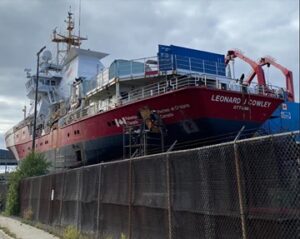
Canadian Coast Guard ‘rolling the dice’ with offshore search and rescue coverage: SEA-NL
Seaward Enterprises Association of Newfoundland and Labrador (SEA-NL) says the Canadian Coast Guard is rolling the dice with maritime safety with only a single primary offshore search and rescue (SAR) vessel dedicated to covering the province’s entire offshore area. “In a maritime environment where every minute could be the difference between life and death in SAR incidents, there is no room for any compromise in response capabilities,” says Merv Wiseman, a member of SEA-NL’s executive, and outspoken advocate for stronger SAR services and fishing-vessel safety. “My question is not just why SAR standards have been lowered, but for how long and whether this is the new normal? >>click to read<< 15:56
Galloway fisherman to lodge Police Scotland complaint after being targeted in huge operation
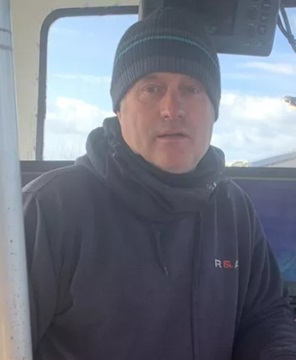 A Galloway fisherman claims he was “victimised” in a major police operation linked to people trafficking. Port William man Paul Maguire had his boat temporarily impounded and guarded, his crew house raided and quayside lobster shed searched. Police also raided his parents’ home in nearby Mochrum while his mother was celebrating her 90th birthday. According to witnesses at the scene, armed officers forced entry to the lobster shed shouting a warning. Police Scotland confirmed they had warrants to search the premises. The operation began when a UK Border Force vessel pulled alongside Mr Maguire’s boat in Luce Bay at 1pm last Wednesday. >>click to read<< 14:35
A Galloway fisherman claims he was “victimised” in a major police operation linked to people trafficking. Port William man Paul Maguire had his boat temporarily impounded and guarded, his crew house raided and quayside lobster shed searched. Police also raided his parents’ home in nearby Mochrum while his mother was celebrating her 90th birthday. According to witnesses at the scene, armed officers forced entry to the lobster shed shouting a warning. Police Scotland confirmed they had warrants to search the premises. The operation began when a UK Border Force vessel pulled alongside Mr Maguire’s boat in Luce Bay at 1pm last Wednesday. >>click to read<< 14:35
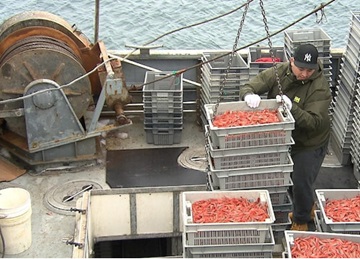
Northern Shrimp fishing: DFO proposals do not pass muster in the industry
Northern shrimp fishermen from Quebec and the Atlantic wholeheartedly reject the new precautionary approach presented by Fisheries and Oceans Canada (DFO) scientists to protect stocks. The fishing associations of Quebec, New Brunswick and Newfoundland and Labrador, industrialists and DFO scientists were gathered during two days for the advisory committee which ended Wednesday in Quebec. Northern shrimp stocks in the Estuary and Gulf of St. Lawrence are not likely to improve, according to Fisheries and Oceans Canada. >>click to read<< 11:47
Commercial Fisherman Scott Allan Fulford of Peabody, MA, has passed away
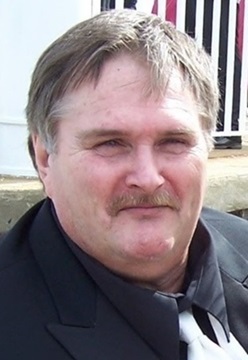 Scott Allan Fulford, 69, of Peabody, MA, passed away peacefully on October 31, 2023 at the Kaplan House with his family lovingly by his side. Scott was born on July 26, 1954 in Gloucester, MA to Robert and Mary “Mairi” (Sylvester) Fulford. It was here that his true love for the water began. He grew up in East Gloucester, learning all the ins and outs of the commercial fishing industry. He began working alongside his father at the age of 12. He would work in the family business before and after school. Fishing was the Fulford way of life. It was all that they knew. It has been said that Scott never needed maps; he intuitively navigated the waters. After graduating from Gloucester High School in 1972, he went on to carry out his high school goal of owning his own fleet of fishing vessels. He was the proud Captain of Lisa Marie, Sea Hag, The Rolling Stone II and Step Two. Like so many other fishermen, and his dad before him, he worked on the infamous Phyllis A. >>click to read<< 10:47
Scott Allan Fulford, 69, of Peabody, MA, passed away peacefully on October 31, 2023 at the Kaplan House with his family lovingly by his side. Scott was born on July 26, 1954 in Gloucester, MA to Robert and Mary “Mairi” (Sylvester) Fulford. It was here that his true love for the water began. He grew up in East Gloucester, learning all the ins and outs of the commercial fishing industry. He began working alongside his father at the age of 12. He would work in the family business before and after school. Fishing was the Fulford way of life. It was all that they knew. It has been said that Scott never needed maps; he intuitively navigated the waters. After graduating from Gloucester High School in 1972, he went on to carry out his high school goal of owning his own fleet of fishing vessels. He was the proud Captain of Lisa Marie, Sea Hag, The Rolling Stone II and Step Two. Like so many other fishermen, and his dad before him, he worked on the infamous Phyllis A. >>click to read<< 10:47
Nantucket’s Commercial Scalloping Season Opens With “Cautious Optimism”
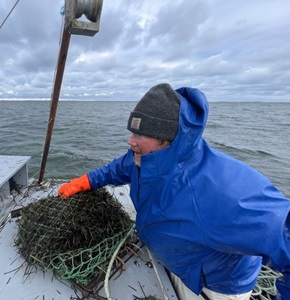 Nantucket’s 2023-24 commercial scalloping season began Wednesday under cloudy skies, along with some wind and rain, as the hunt for the island’s prized shellfish was renewed. About 15 scallop boats were out in Nantucket Harbor, along with another five in Madaket Harbor Island fish markets set the wholesale price paid to scallopers at $15 to $18 per pound, down from the start of last season, and the retail prices ranged from $20 to $25 per pound. But all of that – the number of boats out fishing, the prices, and the demand – will be fleshed out and subject to change as the first week of fishing rolls along, said Samantha Denette, executive director of the Nantucket Shellfish Association. “It’s always cautious optimism and trying to be optimistic,” Denette said. “We’re not looking at a banner year but we’re not looking at a dud either. I feel good about us being in the middle. But we can’t make the call on day one if it’s going to be either/or.” >>click to read<< 08:55
Nantucket’s 2023-24 commercial scalloping season began Wednesday under cloudy skies, along with some wind and rain, as the hunt for the island’s prized shellfish was renewed. About 15 scallop boats were out in Nantucket Harbor, along with another five in Madaket Harbor Island fish markets set the wholesale price paid to scallopers at $15 to $18 per pound, down from the start of last season, and the retail prices ranged from $20 to $25 per pound. But all of that – the number of boats out fishing, the prices, and the demand – will be fleshed out and subject to change as the first week of fishing rolls along, said Samantha Denette, executive director of the Nantucket Shellfish Association. “It’s always cautious optimism and trying to be optimistic,” Denette said. “We’re not looking at a banner year but we’re not looking at a dud either. I feel good about us being in the middle. But we can’t make the call on day one if it’s going to be either/or.” >>click to read<< 08:55
House Republicans rebuff move by Golden to block offshore wind in Gulf of Maine lobster area
 Majority Republicans in the U.S. House of Representatives rejected an attempt by Rep. Jared Golden, D-Maine, to use federal spending to block offshore wind development in a lobster fishing area of the Gulf of Maine. Golden, who tried to amend 2024 appropriations legislation for the Department of Interior, said he will try again to bar offshore wind development in what’s known as Lobster Management Area 1. His measure sought to prevent funding to lease, license, permit or provide any authorization to develop offshore wind energy that could jeopardize lobster fishing. “Offshore wind development in the Gulf’s most productive fishing grounds is a threat to Maine fishermen’s way of life,”>>click to read<< 07:28
Majority Republicans in the U.S. House of Representatives rejected an attempt by Rep. Jared Golden, D-Maine, to use federal spending to block offshore wind development in a lobster fishing area of the Gulf of Maine. Golden, who tried to amend 2024 appropriations legislation for the Department of Interior, said he will try again to bar offshore wind development in what’s known as Lobster Management Area 1. His measure sought to prevent funding to lease, license, permit or provide any authorization to develop offshore wind energy that could jeopardize lobster fishing. “Offshore wind development in the Gulf’s most productive fishing grounds is a threat to Maine fishermen’s way of life,”>>click to read<< 07:28
Alaska seafood harvesting jobs decline as fish crashes, pandemic and other factors take toll
Alaska fish-harvesting employment declined in 2022, a continuing yearslong slide caused by a variety of factors, according to an analysis by the state Department of Labor and Workforce Development. Employment for people harvesting seafood dropped by about a quarter from 2015 to 2022, according to the analysis, published in the November issue of Alaska Economic Trends, the department’s monthly research magazine. The industry lost ground compared to other sectors of the Alaska economy, the analysis found. Seafood harvesting accounted for 7.3% of Alaska jobs in July of 2021, but only 5.7% of Alaska jobs were in seafood harvesting in the following July. Fishery work is highly seasonal, and July is the peak month for it. >>click to read<< 16:15
Incredible herring haul means viable Isle of Man fishery ‘could be a reality’ for the first time in 25 years
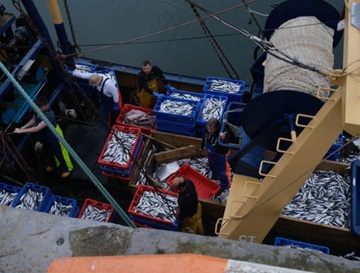 Local fishermen have successfully caught the allocated 100 tonne quota of herring in Manx waters within weeks of receiving Government support to diversify. Three local crews took advantage of the financial support provided by the Department of Environment, Food and Agriculture following new UK quotas earlier this year. Clare Barber Mallocated 100 tonne quotaHK, Environment, Food and Agriculture Minister said: ‘It’s been a real success story.’ The recent catch has led to great optimism across the industry that a commercially viable Manx fishery could be a reality for the first time in 25 years – especially as the quota could quadruple by 2026. >>click to read<< 14:28
Local fishermen have successfully caught the allocated 100 tonne quota of herring in Manx waters within weeks of receiving Government support to diversify. Three local crews took advantage of the financial support provided by the Department of Environment, Food and Agriculture following new UK quotas earlier this year. Clare Barber Mallocated 100 tonne quotaHK, Environment, Food and Agriculture Minister said: ‘It’s been a real success story.’ The recent catch has led to great optimism across the industry that a commercially viable Manx fishery could be a reality for the first time in 25 years – especially as the quota could quadruple by 2026. >>click to read<< 14:28






